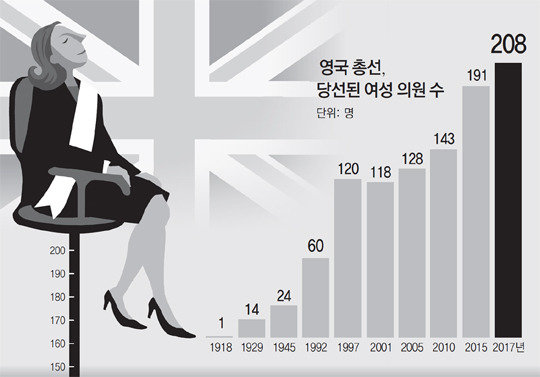Europe enjoys golden age of female politicians
Europe enjoys golden age of female politicians
Posted June. 12, 2017 07:19,
Updated June. 12, 2017 07:26

Compared to elective office system, gender equality has almost been realized in the cabinet system. Last month, French President Emmanuel Macron appointed 11 female ministers exactly half of the entire ministerial posts. In major European nations such as Germany, France, Italy, the Netherlands, Sweden, the post of defense minister known to have very high entry barrier to women are actually taken by females. It appears that there is no sanctuary for males.
It is interesting to see that each and every political party has female members at different proportion. Conservative right-wing parties have relatively fewer female politicians. At the general election currently held in the U.K., some 21 percent of women won the election in the Conservative Party, which is by far less than the number in the Labour Party with 45 percent of women. France is all but same for its general election on Sunday. Female candidates account for the largest portion at 45 percent. While the share of female candidates nominated by the conservative Republican Party stands at some 39 percent, the Communist Party, the far-left political movement of “France Unsubjugated” led by Jean-Luc Mélenchon, has about 53 percent of female candidates, which is higher portion than its male counterparts. Republique en Marche led by President Macron has honored its promise to keep even portion of male and female members.
At the previous general election, 51 seats (17 percent) out of 300 were taken by female politician in Korea, which was ranked at 116 in the world, and that was only possible thanks in large part to 50 percent gender quota system in proportional representation. Korea’s record is nowhere near the average of OECD at 27.8 percent. During the presidential campaign, President Moon Jae-in promised to legislate 30 percent of female lawmakers and to achieve complete gender equality in its cabinet posts within his presidential term. Kang Kyung-hwa who has been nominated as Foreign Minister is a good example even though she is faced with many difficulties in passing the confirmation hearing.
It is not easy to find capable and qualified female leaders who could live up to nation’s expectation. It is said that the Moon Jae-in administration is having hard time finding right female figures to be appointed in the cabinet as the former Lee Myung-bak and Park Geun-hye administrations had been. French President Macron promised to appoint half of the cabinet leaders with females last January but has also confessed his predicament in doing so. It seems that the achievement of French politicians in the general election on Sunday is likely to become a critical turning point to set the bigger stage for more women to enter into politics.
Jung-Min Dong ditto@donga.com
Headline News
- Med professors announce intention to leave hospitals starting Thursday
- Bridge honoring Sgt. Moon Jae-sik unveiled in Pennsylvania
- Chief of Staff Chung tells presidential secretaries to stay away from politics
- US FTC bans noncompete agreements
- N. Korea launches cyberattacks on S. Korea's defense companies







